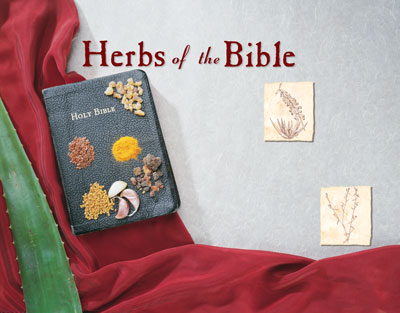The Top 14 Herbs Of The Bible
People have been using herbs for thousands of years because of their culinary and medicinal benefits. Here are the most popular herbs of the Bible, and what they were traditionally used for.
1. Aloe
The Aloe vera plant has been used for thousands of years to heal a variety of conditions, mos notably burns, wounds, skin irritations, and constipation. Aloe was also used to embalm the dead, as well as for perfume.
Today, aloe is used in many ways including treating burns, sunburns, healing bruieses and rashes, moisturize skin, fight athletes foot, prevent scarring and stretch marks, speed up hair growth, and many more.
2. Anise
All parts of the anise plant were used during Biblical times. The seeds, leaves and stem were used to cool high temperatures, as well as for other medicinal purposes.
Today, Anise can be used to help with digestion and can be used as an anti-flatulence agent, relief aid for coughs and colds and also can help with insomnia. Usually taken by crushing the seeds into a tea.
3. Balm
Balm refers to an extremely fragrant substance that was extracted from the balsam tree.
In biblical times, balsam was considered extremely valuable. Its gum was used as incense, while the oil that came from the bark, the leaves and the berries worked well as medicine.
4. Bitter Herbs
Bitter herbs are a collective term used for lettuce, horehound, tansy, horseradish, endive and coriander seeds. Bitter herbs were mostly used for food. In fact, the people of Israel were commanded to have bitter herbs with their Passover lamb.
Today, they can be used to help with urinary tract infections, kidney stones, fluid retention, achy joints and gout.
5. Casia
Casia oil was popularly used as anointing oil during Biblical times. Cassia has aromatic properties quite similar to cinnamon.
Today, Cassia can be used as natural hair care, coloring and conditioning. The leaves are harvested, dried and ground into a powder used for natural hair care.
6. Cinnamon
Cinnamon, once considered more precious than gold, has some amazing medicinal benefits. The bark, where the oil comes from, was traditionally collected for anointing oil, as well as perfume.
Today, cinnamon can be used for athlete’s foot, indigestion, improve brain function, helps lower blood glucose levels, among many others.
7. Cumin
The ancient Israelities took cumin seeds, dried them, and used them to flavor their food. Today, cumin can help with digestion, cardiovascular disease, urinary disorders, and fever.
8. Frankincense
Most popularly known for incense, Frankincense was used during ceremonial offerings and considered an article of luxury. Today, it can be used as an analgesic, antidepressant and sedative, in addition to being a powerful healing herb. Frankincense is also a primary ingredient in stress-reducing incenses.
9. Garlic
Garlic has been used as both food and medicine in many cultures for thousands of years, dating back to when the Egyptian pyramids were built.
Today, garlic is used to help prevent heart disease, including atherosclerosis or hardening of the arteries (plaque buildup in the arteries that can block the flow of blood and may lead to heart attack or stroke), high cholesterol, high blood pressure, and to boost the immune system. Garlic may also help protect against cancer.
10. Hyssop
Hyssop is a sweet smelling plant from the mint family.
It was used in many ceremonial rituals of the Israelities, as burning hyssop typically meant an inner cleansing.
11. Mint
Mint has been used for thousands of years as a culinary herb and for medicine. Today, mint can help with stomach aches, poor digestion, fever, hiccups, ear aches and sinuses.
12. Mustard
One of Jesus’s most famous parables was about the mustard seed. This may be because mustard grew so abundantly in Palestine. Today, mustard can be used for soar throats, muscle and back relaxing, and as a hair conditioner to treat damaged hair.
13. Myrrh
In biblical times, it was sold as a spice or an ingredient of the anointing oil used in the Tabernacle, or as a salve for the purification of the dead. In the Roman world, it was considered a natural remedy for almost every human affliction, from earaches to hemorrhoids. Today, myrrh can be used as a cleansing agent and to helpw tih ulcerated throats and mouth sores.
14. Saffron
The most expensive spice in the world today was also very dear during ancient times. Because of the its distincy yellow color, saffron was used not only for flavoring but to make ancient dyes as well. Ancient peoples used saffron to treat stomach upsets, bubonic plague, and smallpox.
Today, recent studies have indicated possible health benefits, including cancer-inhibiting properties, aiding in allergies, help combat depression, and promote a feeling of fullness ( in terms of diet ).


0 Response to "The Top 14 Herbs Of The Bible"
Post a Comment